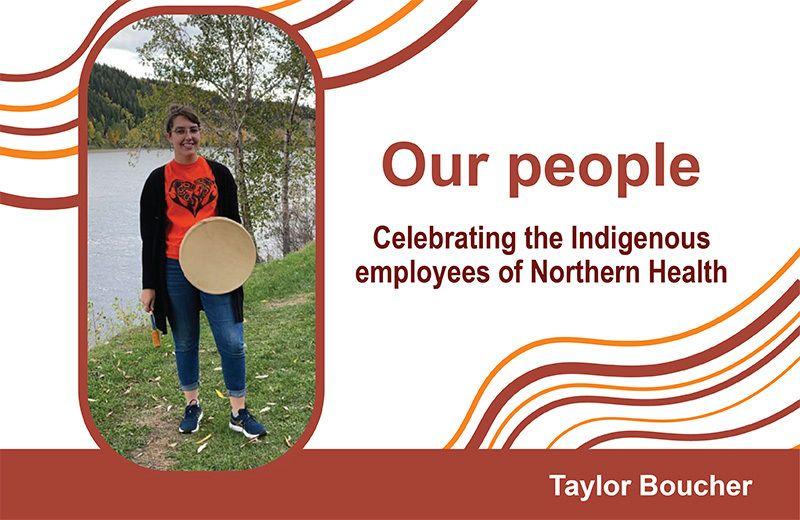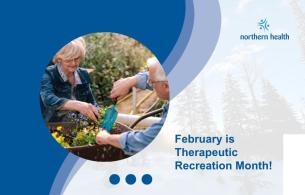June is Indigenous History Month. This is a time for all Canadians – Indigenous, non-Indigenous, and newcomers – to reflect on and celebrate the history, heritage, and diversity of First Nations, Inuit, and Métis Peoples in Canada.
At Northern Health, we want to celebrate our Indigenous colleagues who contribute in countless ways to help us uphold our commitment to building a health system that honours diversity and delivers culturally safe services by providing respectful and inclusive programs and initiatives across Northern BC.
Whether they are an Indigenous Patient Liaison, a Nurse Practitioner, or the VP of Indigenous Health, the Indigenous employees of Northern Health are our friends and neighbours, and we want to get to know them better! To that end, we’ll be sharing interviews and conversations with Indigenous workers at Northern Health about their roles and experiences in their professions during the month of June.
Taylor Boucher: Indigenous Patient Liaison Worker, UHNBC, Prince George, BC
Why did you want to work in health care?
When I applied and got hired, I didn’t really realize how involved in health care I would truly be (as I’m hired by Carrier Sekani Family Services (CSFS))! My bachelor's degree was in social sciences and culture, and my working life has been in community planning with Indigenous communities and supporting Indigenous youth and family in the school district. The only thing I was thinking of when I applied for my role here at the hospital was continuing my goal of supporting Indigenous people and their families. Since starting, I understand how needed this role is in a health care setting. Many of our Indigenous community members carry trauma, and mistrust regarding hospitals. For many, they have already experienced very negative encounters with health care in the past.
What means the most to you about your job?
To me the most important thing about my work is ensuring an Indigenous patient and/or family feels heard, valued, and respected while receiving the care they need. If I can go home at the end of the day and know I’ve eased some small amount of worry or fear in at least one patient or family member, I feel I’ve done well.
Who is your inspiration in health care?
Working in such a dynamic environment, there are so many people who strive to be better and be the best they can for their patients.
What was a significant moment for you in your career?
Shortly after being hired, I met an elderly patient in the ER and his family. I was able to work with the patient and family, getting to know them from the first day they came into the emergency room all the way to his passing several months later on a medical unit of the hospital. The family and I spoke daily, we tried to bring joy and comfort to the patient in any way we could, and I was there with the family on the patient’s last days with us. It was my first time being with a family from the first day, until their final days in our care. I will never forget the family's gentleness and the love and respect they held for the patient, who was also very sweet. Not only did I learn a lot about the hospital processes and protocols, but I’m also very thankful to have spent that time with the family and learn from them. I think that family will always hold space within me.
How did you get where you are today?
I have always had a very supportive family who has encouraged me and supported me going to university. I received my bachelor's degree in Anthropology and First Nations Studies. But I always knew that in some capacity I would be working directly with Indigenous communities. We spend so much of our lives working, I think it’s important to be doing something you can find joy and purpose within. It’s okay to have different jobs and try different roles, they won’t all be successful. You just have to be willing to try on different hats until you find the one that fits!
What does it mean to you to be an Indigenous person in health care?
It’s important to have an understanding of the background and barriers our patients and families face. Being an Indigenous person helps provide insight into how my patients and their family members may be feeling, and some of the things they’ve experienced in the past. I have an understanding on how to speak with my Elders and some of the protocols involved. I can be a voice for my patients and their families to speak out against issues and concerns, to bring up questions. As an Indigenous person, I’m in the hospital to advocate alongside our Indigenous patients. It’s critical we have more Indigenous peoples in health care to support our community members.














Comments
Individuals with concerns or complaints should first speak with the person who provided the service, or to the manager of the area. Complaints are best addressed and resolved at the time and place they occur.
If this isn’t an option or doesn’t serve you, the next step is to speak to local administration.
If your complaint remains unresolved, please contact the NH Patient Care Quality Office (https://www.northernhealth.ca/contact/patient-care-quality-office)